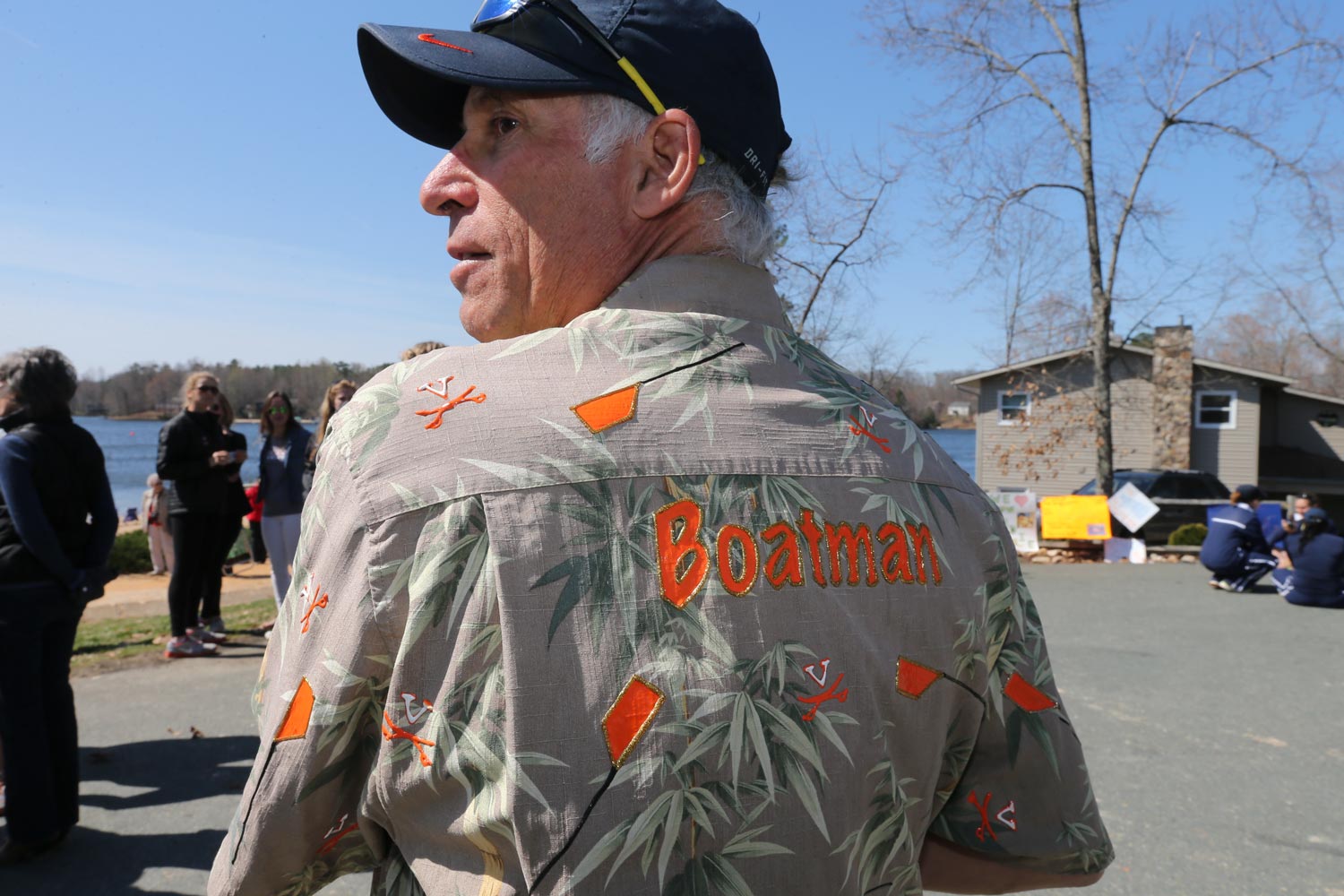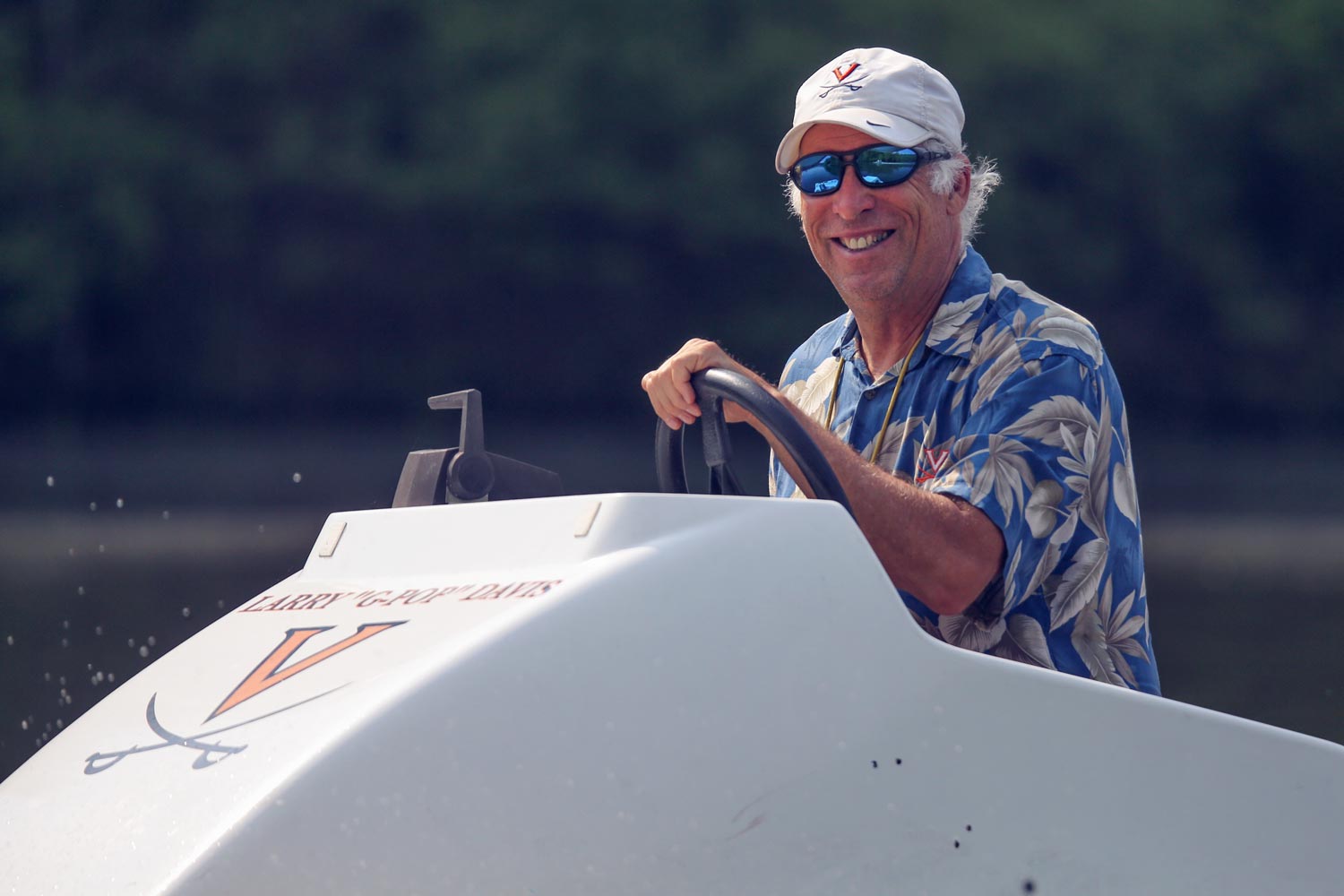One day in the mid-1990s, Roger Payne found himself in a motorboat with Kevin Sauer during a rowing scrimmage in Southwest Virginia. Payne then was the University of Wisconsin’s boatman, and Sauer was head coach of the fledgling varsity women’s program at the University of Virginia.
“We got to chatting,” Payne recalled, “and I said, ‘Sometime when you have a boatman job, I’m certainly interested.’ I just threw that out there.”
Sauer didn’t forget. In 2004, he contacted Payne, who was still at Wisconsin. Payne was ready for a change, as was his wife, Kathie, a medical microbiologist.
“She was tired of winter,” Payne said.
His parents lived in Georgia, and their health was starting to decline. In Charlottesville, Payne would be much closer to them, and he’d also be able to pursue his passion for gardening year-round. Moreover, Payne said he was eager to work for “somebody that you really respect and really treats everybody as family” – qualities he saw in Sauer.
“I said, ‘Yeah, I’m interested,’” Payne recalled. “Kevin said, ‘You know what this pays?’ And I said, ‘Yeah, I know. I’m still interested.’
“I took a huge pay cut to come here, but happiness is as important as anything else. My wife, the second day she was here, she was offered a job making $20,000 a year more than she made in Madison. So it all equaled out. It just worked out really well. I’ve really enjoyed my time here.”
A 1976 graduate of the University of Washington, Payne is not leaving Charlottesville, but he’s retiring this summer as the Cavaliers’ boatman after a long, memorable run.
“Roger is awesome, and we will definitely miss him!” former UVA rower Ali Zwicker said in an email Tuesday. “He supported the team so much and in so many different ways.”
Payne said: “I still enjoy what I do. It’s just that I don’t want to do it every day anymore.”
As boatman for the Cavaliers, who placed fifth at the NCAA championships in May, Payne was responsible for a little bit of everything.
“You’ve got to be able to fix stuff,” Sauer said. “You’ve got to be able to figure out what’s wrong with things, all the way from the electronics for the coxswain, to the GPS that they have, to the rigging of the boat, to a boat that’s gotten damaged by a log on the reservoir. And then the motorboat engines. That’s the bane of [a boatman’s] existence, because if those don’t work, then I don’t get on the water, and then I’m not in a good mood, right?”

Payne is a familiar figure in the close-knit world of collegiate rowing, with previous career stops at the universities of Washington and Wisconsin. (Photo by Jim Daves, UVA Athletics)
Payne handled repairs at UVA’s boathouse on the Rivanna Reservoir, and he was responsible for maintaining the team’s rowing machines, as well as the rowing tank in Onesty Hall.
“Anything that needs fixing,” Sauer said.
Payne said: “You gotta be able to troubleshoot pretty much anything: electronics, motors, build cabinets at the boathouse. You do it all.”
That’s not all his job has entailed at UVA. Payne also loaded the Cavaliers’ boats onto trailers and drove them to regattas. Often that meant journeys to the West Coast and back.
“From Charlottesville to Sacramento or San Francisco, you schedule it as a four-and-a-half-day trip,” Payne said. “And if everything goes right, you can get there in three and a half.”
In 2010, after the Wahoos won their first NCAA team title, Payne drove back from Sacramento with Steve Pritzker, then the program’s associate head coach.
“That was a fun trip,” recalled Pritzker, now UVA’s senior associate athletics director for business operations, and the athletics department’s chief financial officer.
After winning the NCAA championship, the ’Hoos celebrated that night at a restaurant in Sacramento.
“I remember Roger and I got up to leave, and the whole team stood up and gave us a standing ovation as we walked out,” Pritzker said. “I hope they really valued the parts we played.”
Pritzker smiled. “Maybe it was all for Roger. I’m not really sure. It was a really cool feeling. I had chills. We were [leaving] on this three- or four-day trek, and the girls knew that.”
Payne, who was born in New York City, has been involved in every aspect of the sport. He rowed on the lightweight team at Washington. Later he learned boatbuilding under the legendary George Pocock, one of the central figures in the best-selling book “The Boys in the Boat.” Before taking over as boatman at Wisconsin, where he overlapped with Dick Bennett and Tony Bennett, Payne served as head coach of the women’s team at Oregon State.
“He’s certainly well-respected across the sport,” Pritzker said. “The boatmen all know each other and the coaches all know each other, so it’s a fairly small world.”
Sauer has been interviewing candidates for the boatman’s job. What will make Payne difficult to replace, Pritzker said, are his “institutional knowledge and how quickly he’s able to solve things. He’s the kind of guy that everyone else calls to figure out how to do things, and that’s really valuable in the sport. All the other riggers will call Roger and say, ‘How do you fix this?’”
Payne, whose grandfather was a carpenter, said he’s always liked “working with my hands, just learning stuff and figuring it out.”
“I’ve always been kind of handy, and then there were people around me that were always handy, and I just kind of picked it up.”
Payne also has been something of a pop psychologist at UVA, Sauer said. “He’s had to deal with all these different coaches’ personalities, not just mine, but [those of the assistants as well]. And then he’s dealing with the kids, too. Because the kids may not want to come to the coaches, but they’ll go to Roger and say, ‘Roger, what the heck? What’s wrong with Kevin today?’ Or something like that.
“The kids will go to Roger with things they wouldn’t go to the coaches about.”
Zwicker, who earned two degrees from UVA, rowed this season for the program’s top crew, the Varsity Eight, whose boat is named for Payne. She returned home to British Columbia after the NCAA regatta with fond memories of her time with Payne.
“One of my favorites is when he invites the graduating class to his home (where he and his wife have a beautiful garden and chickens – dinner is made entirely from their backyard!) after NCAAs as our final send-off,” Zwicker wrote. “He is so knowledgeable about the sport of rowing and has countless stories from his many years dedicated to the sport. We especially love the stories he can tell us about Kevin!”
Sauer wants to make sure Payne receives his due before retiring. In May, after the Cavaliers won their ninth consecutive ACC title, conference officials recognized Payne “in front of all the kids and the parents,” Sauer said. “People gave him a standing ovation.”
Two weeks later, after the awards ceremony at the NCAA championships in Sarasota, Florida, “I was able to grab the mic at the end of the NCAA awards and recognize him there, too,” Sauer said. “I think it’s important, because people need to know about people that came before them and people that have been behind the scenes.
“Even though he’s not really behind the scenes – people know him – he’s not a coach, he’s not an athlete. He’s a worker bee, and it’s important for kids to see that.”
That he was recognized in Sarasota in front of the teams from Washington and Wisconsin – two other schools to which he has strong ties – made the moment especially meaningful for Payne.
“I know so many people in rowing,” he said. “You’ve been around forever, so eventually you meet and interact with everybody. And I always try and help anybody out who needs it, and with most of the people that do my job it’s the same way. Something breaks or something else, we’re all there to help you fix it.
“NCAAs was really fun. It was kind of the whole gamut of my experience, with teams that I worked with.”
Payne hopes to end his official tenure at UVA by the middle of this month. But he’ll continue to help the program periodically as a volunteer assistant coach and will aid the next boatman however he can.
“I don’t think he can stay away from the boathouse,” Sauer said, laughing.
“It’ll be different, because Roger’s Roger. But the nice thing is that it’s not like he’s just shutting the door and he’s gone. He’ll be around, and that’s going to make it nice.”
Payne said: “I just want the transition to be smooth. It’s not like I have any place to be.”
What he’s enjoyed most about his work at UVA, Payne said, is his interaction with generations of rowers.
“It’s fun to keep everything going and it’s fun to help out, but the most fun on the job is watching young people come in and develop and grow and become somewhat responsible adults – not that any of us are, totally,” Payne said, laughing.
“And they’re doing something that’s really hard, something that’s really blue collar. There’s no stars, and it’s just work.”
Media Contact
Article Information
July 10, 2018
/content/mr-fix-it-rowing-troubleshooter-leaves-large-legacy

